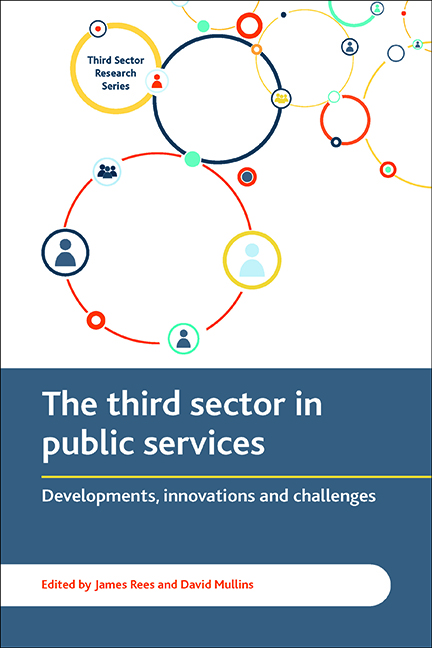Book contents
- Frontmatter
- Contents
- List of tables, figures and boxes
- Series editor’s foreword
- Notes on contributors
- one The third sector delivering public services: setting out the terrain
- Part One Policy, politics and organisations
- Part Two Cross-cutting issue for third sector service delivery
- Part Three Service delivery in key policy fields
- Index
nine - Navigating a new landscape: the third sector delivering contracted employment services
Published online by Cambridge University Press: 05 April 2022
- Frontmatter
- Contents
- List of tables, figures and boxes
- Series editor’s foreword
- Notes on contributors
- one The third sector delivering public services: setting out the terrain
- Part One Policy, politics and organisations
- Part Two Cross-cutting issue for third sector service delivery
- Part Three Service delivery in key policy fields
- Index
Summary
Introduction
The third sector's role in the field of employment services has occupied a high profile position in the debate about public service delivery. This is the result of three main factors: the long history and relatively prominent position of third sector organisations (TSOs) in contracted employment services, the fact that the field has undergone waves of innovation and reform since the initial move to contracted services in the late 1990s, and the contentious nature of recent programmes. In particular, the developments wrought by the UK's Coalition government, elected in 2010, have accelerated previous trends. The two main employment programmes implemented in this period have involved the full adoption of a supply chain contracting model with an intensification of payment by results (PbR) financing. These shifts have created an increasingly commercially managed, more results driven environment with greater resource constraints. In the process, they represent a potentially disruptive juncture in the employment services field, one that has forced TSOs and indeed all providers in the field to understand and adapt to the new landscape or find themselves no longer able to compete (Taylor et al, 2016). While recent governments have sought to promote the sector's role in this area, public debates have often painted TSOs as relatively passive victims of an exploitative private sector (Butler, 2011) – we suggest the need for a more nuanced understanding of the sector's role. The chapter explores the questions that underpin the book; in particular, the impact that delivering services has on TSOs. It highlights the shifting balance between providers from different sectors operating in the employment services field and explores how TSOs have made sense of and navigated this changing landscape, considering the implications for the sector's future role in delivering these services. In the process, it raises more searching questions about what the involvement of the third sector means for our understanding of the content, purpose and sustainability of public services more widely. We demonstrate how the shifting role of TSOs in the employment services field sheds light on the way in which wider policy agendas around the role of the state and the financing of public services play out for providers delivering on the ground.
- Type
- Chapter
- Information
- The Third Sector Delivering Public ServicesDevelopments, Innovations and Challenges, pp. 169 - 188Publisher: Bristol University PressPrint publication year: 2016



